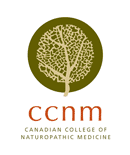
Education
A minimum of 7 years post-secondary education is required to become a Naturopathic Doctor. Like conventional medical schools, Naturopathic medical programs require that applicants meet specific prerequisites such as an undergraduate degree; minimum GPA requirements; and academic prerequisites such as biology, chemistry, physics, psychology, social sciences, and humanities.
Naturopathic students then enter a four-year, full-time graduate-level program at an accredited Naturopathic medical school. Naturopathic education encompasses basic and diagnostic sciences – including anatomy, clinical physiology, biochemistry, pathology, embryology, immunology, pharmacology, physical and clinical diagnosis, and lab diagnosis as well as Naturopathic approaches to improving and maintaining patients’ health. Much of the ND curriculum is devoted to non-pharmaceutical/non-surgical approaches to managing patient conditions, and students spend significant time studying lifestyle counselling, clinical nutrition, botanical medicine, Asian medicine and acupuncture.
The Council on Naturopathic Medical Education (CNME) is the only government-recognized accrediting body for naturopathic medical schools in Canada and the United States. The CNME has accredited the following naturopathic medical programs:
-
Canadian College of Naturopathic Medicine (Boucher Campus, Vancouver, British Columbia)
-
Canadian College of Naturopathic Medicine (Toronto Campus, Ontario)
-
National University of Natural Medicine (Portland, Oregon)
-
Bastyr University (Seattle, Washington)
-
Sonoran University of Health Sciences (formerly Southwest College, Scottsdale, Arizona)
-
National University of Health Sciences (Lombard, Illinois)
-
Universidad Ana G. Méndez (Puerto Rico)
Following successful completion of a CNME-accredited program, a naturopathic doctor is eligible to sit for standardized board exams in order to qualify for regulation/licensing. They must also maintain competency throughout their career by completing a requisite number of hours on continuing education courses.
Individuals completing correspondence programs or other less rigorous training are not recognized by any of the provincial/territorial/state regulatory authorities and do not qualify for licensure or membership with the national/ provincial/territorial/state Naturopathic associations in Canada or the United States.
All members of NBAND must have graduated from CNME-accredited programs and passed the subsequent board exams.




